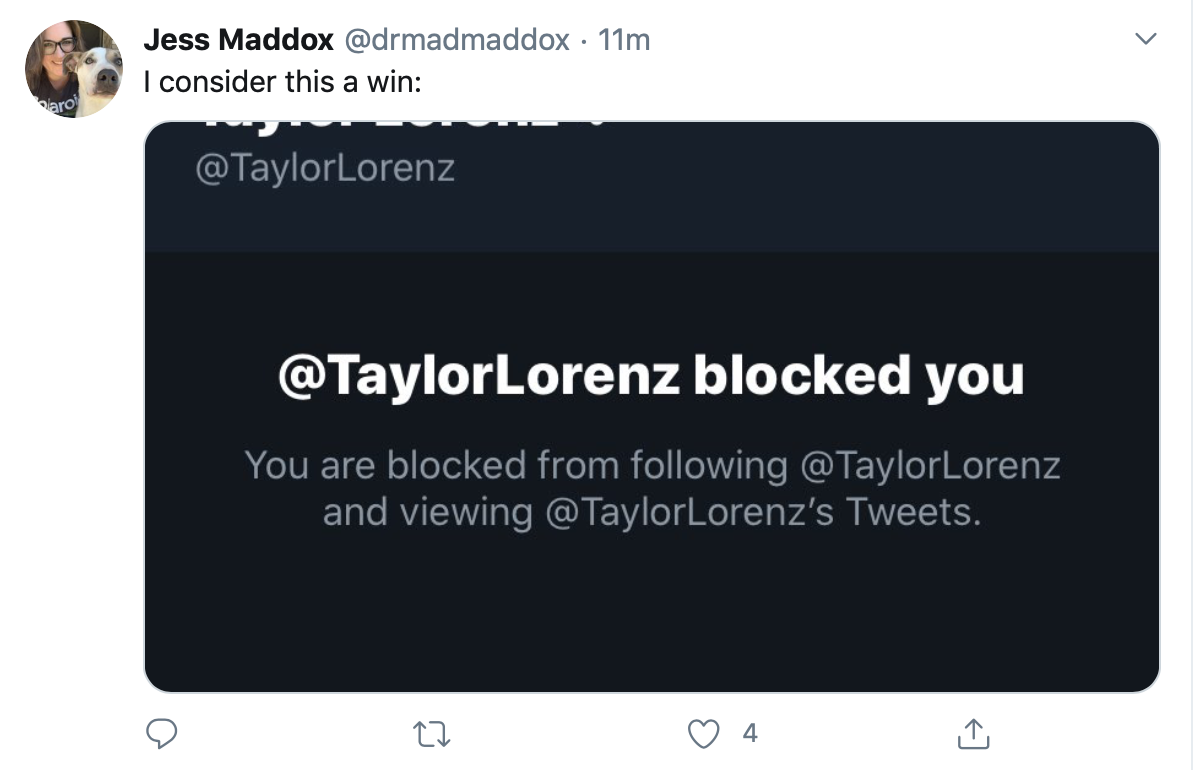Like football and chess players, journalists need to know when to block
/When I criticize journalists during a class or in this space, I generally refrain from saying they should kill themselves.
But that’s not off limits for some media attackers who explode their bile freely and anonymously onto the platforms of social media.
JESS MADDOX’S TWITTER POST FROM TWO YEARS AGO
Taylor Lorenz, an internet culture reporter for the New York Times, was the target of such a sentiment recently, and she decided to call it out on Twitter, saying repeated vicious personal attacks and physical threats had “destroyed my life.” For which she received more attacks, including from Fox News’ Tucker Carlson, who claimed on his talk show that Lorenz was trying to play the victim to deflect from valid criticism of her journalism. Each news organization publicly defended its employee.
Lorenz works in combustible circumstances. Online harassment is particularly bad for female journalists, and worse still for females of color and those who cover male-dominated beats such as technology and sports (bad language alert on link). Because if you’re vile enough to publicly wish harm to journalists, engaging in misogyny just seems natural.
The animus directed toward Lorenz – not just by Carlson but by Silicon Valley executives and venture capitalists – isn’t a large number of random individuals happening to reach the same opinion about her. It comes from targeted campaigns fomented online or on cable TV. Neither she nor any journalist should have to endure hate of this magnitude.
When beaten down by such a torrent, and stressed by the anxiety, it’s only natural that a reporter would get defensive. But that becomes a problem when reporters seek to blunt performance-related criticism that, regardless whether valid or not, is at least fair game. Reasonable people have indeed raised such criticism about some of Lorenz’ work.
Among them is my department colleague, Dr. Jess Maddox, an assistant professor whose research specialties include digital culture and social media. On Twitter, Maddox publicly took issue with some of Lorenz’ reporting methods and writing style. Lorenz blocked her, meaning Maddox couldn’t see any of Lorenz’ tweets. Two years later, she’s still blocked.
Maddox condemns the venom directed at the Times reporter, and says if she were in that spot, “I’d be liberal with the block feature, too.” But Maddox draws a distinction between job criticism and harassment. “Writing anything for the masses involves having some thick skin and an ability to be receptive to constructive criticism. (But) as soon as that criticism descends into personal attacks on one’s character, identity, privacy, or involves any threats of physical harm, we are no longer in the realm of constructive criticism.”
When outside that realm, Maddox offers action options for journalists:
Calibrate social media settings to show comments only from people you know.
Forward threatening emails to company security or law enforcement.
Put public pressure on “Big Tech” and social media platforms to take action against “the toxic harassment that runs rampant on their sites.”
And use the block button liberally if necessary.
That’s good advice. I believe blocking is also justified to help stop people who repeatedly post false and harmful claims on journalists’ social media accounts. But none of this is an invitation to do what Lorenz did to Maddox or what another New York Times reporter, Kenneth Vogel, did on Twitter in 2019, prompting much discussion in journalism circles. He blocked Michael McFaul, a Stanford University professor and former U.S. ambassador to Russia. Not exactly a troll.
McFaul, who had criticized the Times for interviewing the 78-year-old mother of a story subject, called Vogel’s action (which Vogel soon reversed) “unethical.” And he’s right. Ethical journalism means welcoming communication from the public even if – or especially if – it’s negative. It also means not acting like a hypocrite, because if you’re going to dish out the criticism, then you better be able to take it.

